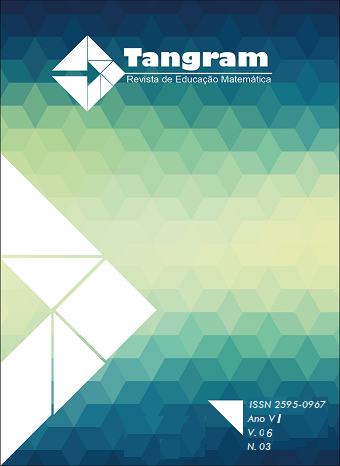Interdisciplinarité et difficulté d’apprentissage des méthodes numériques en programmation
DOI:
https://doi.org/10.30612/tangram.v6i3.16950Keywords:
Réflexivité. Algorithme numérique. Obstacle didactique e syntaxique/sémantique.Abstract
Les algorithmes numériques font l’objet d’un enseignement explicite dans les classes préparatoires à l’entrée aux écoles d’ingénieurs. Le caractère interdisciplinaire de ces derniers, permet de construire un pont entre le langage et l’action et met l’accent sur l’utilité d’une certaine rigueur scientifique expérimentée. Notre recherche s’inscrit dans le cadre d’une démarche réflexive avec une prise de conscience centrée sur les difficultés liées à l’implémentation de la méthode d’Euler comme algorithme numérique pour la résolution des équations différentielles. L’exploration d’un milieu théorique fondé sur les méthodes numériques d’approximation, que nous avons menée, nous a permis de dégager différents types d’obstacles didactique rencontrés lors de l'implémentation de la solution numérique d’ordre sémiotique, organisationnel ou encore psychologique. Elle a aussi dénoté d’une certaine complexité syntaxique des relations de récurrences à analyser dans un aspect sémantique. Nous nous plaçons alors dans le cadre de la théorie des champs conceptuels développée dans les travaux de (Vergnaud, 1990) croisée à la notion de registres développé par (Duval, 1993) afin d’analyser ces difficultés dans une dimension syntaxique/sémantique (Kouki, 2018).
Downloads
References
Daniel, M. (2021, Fevier). Algorithme numérique. Récupéré sur Ecole Polytech Marseille: https://marc-daniel.pedaweb.univ-amu.fr/Algonum/Algonum2diap.pdf
Darbelley, F. (2011, Octobre). Vers une théorie de l'interdisciplinarité ? entre unité et diversité. Nouvelles perspectives en sciences sociales, 7(1), pp. 65-87.
Duval. (1993). Registres et représnettaions sémiotiques et fonctionnement cognitif de la pensée. Annales de didactique et de sciences cognitifs, 37-65.
Julien, A. (2019-2020). TP : Résolution d’équations différentielles : méthode d’Euler. Récupéré sur http://desaintar.free.fr/python/tp/tp_euler.pdf: http://desaintar.free.fr/python/tp/tp_euler.pdf
Kirkerud.B. (1996). "Use- Read- Change" : a new introductioary course in informatics . Norsk Informatik Konferense, (pp. 173-180).
Kouki, R., & Griffiths, B. (2021). Semiotic Aspects of Differential Equations: Analytical and Graphical Competency in the USA and Tunisia. African Journal of Research in Mathematics, Science and Technology Education, 174-184.
Kouki (2018) L'articultaion des dimensions syntaxiques et sémantiques en algèbre du secondaire. Dans recherche en didactiques des mathématiques (pp. 43-78). la Pensée sauvage.
Reinfelds.J. (1995). Logic in first courses for computer science majors. World Conference on Computers in Education VI: liberating the learner, (pp. 467-477).
Rogalski, & Lagrange. (2017). Savoirs, concepts et situations dans les premiers apprentissages en programmation et en algorithmique. Récupéré sur https://hal.archives-ouvertes.fr: https://hal.archives-ouvertes.fr/hal-01740442/document
Samurçay, & Rogalski. (1991). Acquisition of programming knowledge and skills. Dans Psychology of programming. Elsevier.
T.Phit-Huan, Siew-Woei, L., & Choo-Yee, T. (2009). Learning difficulties in programming courses: Undergraduates perspective and perception. International Conference on Computer Technology and Development, (pp. vol.2, pp. 42–46).
Tarski. (1923-1944). Logique, sémantique, mathématique. Arman Colin, vol1, 1972.
Vergnaud. (1989). La théorie des champs conceptuels. Publications de l’Institut de recherche mathématiques de Rennes, (pp. 47-50). Rennes.
Vergnaud. (1990). La théorie des champs conceptuels,. Recherches en Didactique des Mathématiques. La Pensée Sauvage, pp. vol.10 n°2-3, pp.133-170, éd.
Zamzouri, & Rosminah. (2012). Difficulties in learning programming : Views of students. 1st International Conference oo Current Issues in Education ICCIE. Yogyakarta, Indonesia.
Downloads
Published
How to Cite
Issue
Section
License

This work is licensed under a Creative Commons Attribution-NonCommercial-ShareAlike 3.0 Unported License.
Authors must accept the publication rules when submitting the journal, as well as agree to the following terms:
(a) The Editorial Board reserves the right to make changes to the Portuguese language in the originals to maintain the cultured standard of the language, while respecting the style of the authors.
(b) Authors retain the copyright and grant the journal the right to first publication, with the work simultaneously licensed under the Attribution-NonCommercial-ShareAlike 3.0 Brazil (CC BY-NC-SA 3.0 BR) that allows: Share - copy and redistribute the material in any medium or format and Adapt - remix, transform, and create from the material. CC BY-NC-SA 3.0 BR considers the following terms:
- Attribution - You must give the appropriate credit, provide a link to the license and indicate whether changes have been made. You must do so under any reasonable circumstances, but in no way that would suggest that the licensor supports you or your use.
- NonCommercial - You may not use the material for commercial purposes.
- Sharing - If you remix, transform, or create from material, you must distribute your contributions under the same license as the original.
- No additional restrictions - You may not apply legal terms or technological measures that legally restrict others from doing anything that the license permits.
(c) After publication, authors are allowed and encouraged to publish and distribute their work online - in institutional repositories, personal page, social network or other scientific dissemination sites, as long as the publication is not for commercial purposes.






